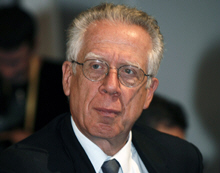
Typical street scene in Santa Ana, El Salvador. (Photo: iStock)
IMF Survey: Padoa-Schioppa Chosen as IMFC Chairman
October 5, 2007
- Italian Economy Minister to head IMFC for period up to three years
- Committee meets twice a year to set IMF's political direction, priorities
- Padoa-Schioppa has been Economy Minister of Italy since May 2006
The IMF said Italian Economy and Finance Minister Tommaso Padoa-Schioppa was selected to succeed Gordon Brown as Chairman of its International Monetary and Financial Committee (IMFC).

Italian Economy Minister Padoa-Schioppa selected to head the IMF's policy steering committee (photo: Lehtikuva/Reuters)
IMF'S POLITICAL OVERSIGHT
Padoa-Schioppa will head the IMFC, which sets the IMF's political direction and overall policy priorities, at its next session during the 2007 IMF-World Bank Annual Meetings in Washington D.C. October 20-22.
The meeting will be its first since global markets were roiled by financial turbulence triggered by the collapse of the U.S. subprime mortgage market. Padoa-Schioppa also takes over as head of the IMFC at the same time as France's Dominique Strauss-Kahn is set to succeed Rodrigo de Rato as Managing Director of the IMF. De Rato will step aside at the end of October.
Padoa-Schioppa, 67, has been Economy and Finance Minister in the government of Italian Prime Minister Romano Prodi since May 2006. His selection to head the IMFC for a term of up to three years follows Gordon Brown's July resignation, after eight years in the post, on becoming British prime minister.
Padoa-Schioppa served as a member of the Executive Board of the European Central Bank from 1998 to 2005. Prior to that, he was chairman of Italy's financial market authority (Consob), and held senior positions in the Bank of Italy and the European Commission. He has served in a leadership capacity on various European and international economic and monetary committees.
The 24-member IMFC typically comprises finance ministers and central bank governors from the same countries and constituencies as are represented on the IMF's Executive Board. The panel has operated since September 30, 1999 following a resolution of the IMF Board of Governors.
Stronger role
The 1999 resolution transformed the Interim Committee of the Board of Governors on the International Monetary System (usually known simply as the Interim Committee)—established in 1974—into the IMFC. The change signified a strengthening of the role of the primary advisory committee of the Board of Governors.
As with the Interim Committee, the IMFC usually meets twice a year—before the IMF-World Bank Annual Meetings in September or October and at the institutions' Spring Meetings, which take place in April.
The Board of Governors resolution on the IMFC stipulates that its Chair is selected by the Committee to serve for such period as the Committee determines.
In line with the selection of the previous 15 chairmen of the IMFC and its predecessor, the Interim Committee, the process of selecting the Chair involves consultations among IMFC members at the level of IMF Executive Directors and in capitals of member countries until a consensus on a new IMFC Chair is reached.


